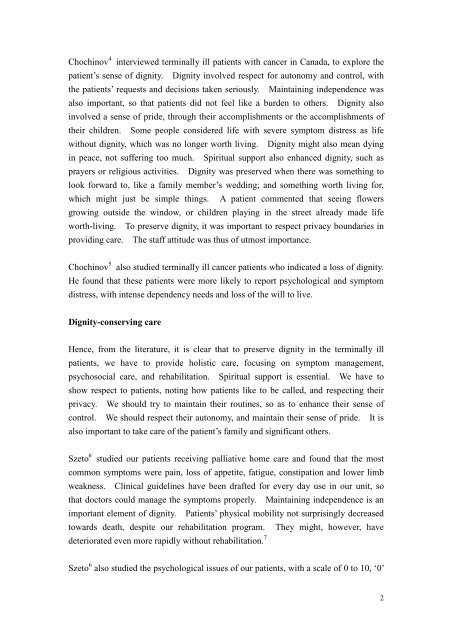Full paper Human dignity in patients with terminal illness
Full paper Human dignity in patients with terminal illness
Full paper Human dignity in patients with terminal illness
You also want an ePaper? Increase the reach of your titles
YUMPU automatically turns print PDFs into web optimized ePapers that Google loves.
Choch<strong>in</strong>ov 4 <strong>in</strong>terviewed term<strong>in</strong>ally ill <strong>patients</strong> <strong>with</strong> cancer <strong>in</strong> Canada, to explore thepatient’s sense of <strong>dignity</strong>. Dignity <strong>in</strong>volved respect for autonomy and control, <strong>with</strong>the <strong>patients</strong>’ requests and decisions taken seriously. Ma<strong>in</strong>ta<strong>in</strong><strong>in</strong>g <strong>in</strong>dependence wasalso important, so that <strong>patients</strong> did not feel like a burden to others. Dignity also<strong>in</strong>volved a sense of pride, through their accomplishments or the accomplishments oftheir children. Some people considered life <strong>with</strong> severe symptom distress as life<strong>with</strong>out <strong>dignity</strong>, which was no longer worth liv<strong>in</strong>g. Dignity might also mean dy<strong>in</strong>g<strong>in</strong> peace, not suffer<strong>in</strong>g too much. Spiritual support also enhanced <strong>dignity</strong>, such asprayers or religious activities. Dignity was preserved when there was someth<strong>in</strong>g tolook forward to, like a family member’s wedd<strong>in</strong>g; and someth<strong>in</strong>g worth liv<strong>in</strong>g for,which might just be simple th<strong>in</strong>gs. A patient commented that see<strong>in</strong>g flowersgrow<strong>in</strong>g outside the w<strong>in</strong>dow, or children play<strong>in</strong>g <strong>in</strong> the street already made lifeworth-liv<strong>in</strong>g. To preserve <strong>dignity</strong>, it was important to respect privacy boundaries <strong>in</strong>provid<strong>in</strong>g care. The staff attitude was thus of utmost importance.Choch<strong>in</strong>ov 5 also studied term<strong>in</strong>ally ill cancer <strong>patients</strong> who <strong>in</strong>dicated a loss of <strong>dignity</strong>.He found that these <strong>patients</strong> were more likely to report psychological and symptomdistress, <strong>with</strong> <strong>in</strong>tense dependency needs and loss of the will to live.Dignity-conserv<strong>in</strong>g careHence, from the literature, it is clear that to preserve <strong>dignity</strong> <strong>in</strong> the term<strong>in</strong>ally ill<strong>patients</strong>, we have to provide holistic care, focus<strong>in</strong>g on symptom management,psychosocial care, and rehabilitation. Spiritual support is essential. We have toshow respect to <strong>patients</strong>, not<strong>in</strong>g how <strong>patients</strong> like to be called, and respect<strong>in</strong>g theirprivacy. We should try to ma<strong>in</strong>ta<strong>in</strong> their rout<strong>in</strong>es, so as to enhance their sense ofcontrol. We should respect their autonomy, and ma<strong>in</strong>ta<strong>in</strong> their sense of pride. It isalso important to take care of the patient’s family and significant others.Szeto 6 studied our <strong>patients</strong> receiv<strong>in</strong>g palliative home care and found that the mostcommon symptoms were pa<strong>in</strong>, loss of appetite, fatigue, constipation and lower limbweakness. Cl<strong>in</strong>ical guidel<strong>in</strong>es have been drafted for every day use <strong>in</strong> our unit, sothat doctors could manage the symptoms properly. Ma<strong>in</strong>ta<strong>in</strong><strong>in</strong>g <strong>in</strong>dependence is animportant element of <strong>dignity</strong>. Patients’ physical mobility not surpris<strong>in</strong>gly decreasedtowards death, despite our rehabilitation program. They might, however, havedeteriorated even more rapidly <strong>with</strong>out rehabilitation. 7Szeto 6 also studied the psychological issues of our <strong>patients</strong>, <strong>with</strong> a scale of 0 to 10, ‘0’2




